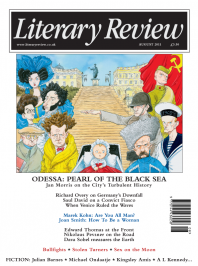Matthew Adams
Battle Acts
Complete Stories
By Kingsley Amis
Penguin Classics 528pp £25
Kingsley Amis’s critical lexicon was not a large one. It turned upon a single word – ‘good’ – dispensed with dashes of intensification or qualification as occasion demanded. The summit of his approbation was a fulsome ‘bloody good’. ‘Good’ meant that you had done really quite well; ‘some good’ (Amis’s verdict on his own body of novels) was not bad at all; and a curt ‘no good’ was about as damning as you could get. Unless, as Christopher Hitchens records in his memoir, Hitch-22, you happened to have produced something of the order of Graham Greene’s The Human Factor, which Amis declared ‘Absolutely no. Bloody good. AT ALL!’
There was a lot about this blunt mode of appraisal that Amis enjoyed: its directness, its anti-intellectualism, its pub-verdict certainty; and he clearly liked the irritation it would have induced in exponents of a more ‘nuanced’ and ostensibly academic approach to literature. (In the superb short story ‘Dear

Sign Up to our newsletter
Receive free articles, highlights from the archive, news, details of prizes, and much more.@Lit_Review
Follow Literary Review on Twitter
Twitter Feed
How to ruin a film - a short guide by @TWHodgkinson:
Thomas W Hodgkinson - There Was No Sorcerer
Thomas W Hodgkinson: There Was No Sorcerer - Box Office Poison: Hollywood’s Story in a Century of Flops by Tim Robey
literaryreview.co.uk
How to ruin a film - a short guide by @TWHodgkinson:
Thomas W Hodgkinson - There Was No Sorcerer
Thomas W Hodgkinson: There Was No Sorcerer - Box Office Poison: Hollywood’s Story in a Century of Flops by Tim Robey
literaryreview.co.uk
Give the gift that lasts all year with a subscription to Literary Review. Save up to 35% on the cover price when you visit us at https://literaryreview.co.uk/subscribe and enter the code 'XMAS24'